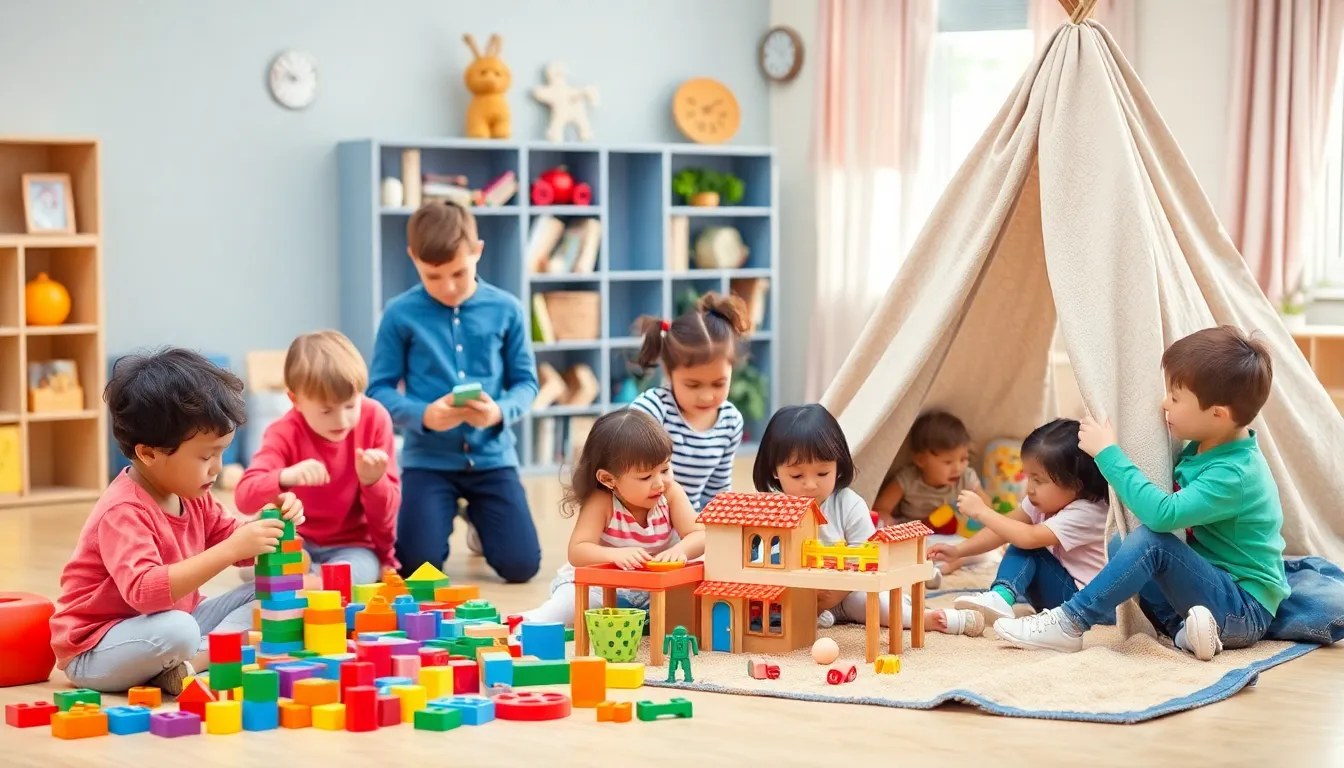Table of Contents
TogglePlaytime isn’t just about fun and games; it’s the secret sauce for a child’s growth and development. While parents might think their little ones are simply goofing off, they’re actually engaging in valuable activities that shape their future. Who knew that building a fort out of couch cushions could be a masterclass in engineering and creativity?
Overview of Play in Child Development
Play serves as a fundamental component in child development, fostering a range of essential skills. Engaging in activities like imaginative role-playing encourages creativity and problem-solving. Hands-on experiences during play help children develop physical coordination and fine motor skills, crucial for tasks such as writing.
Social interactions that occur during play enhance communication and teamwork abilities. When children play together, they learn to share, negotiate, and resolve conflicts. These experiences lay a foundation for healthy relationships in later life.
Play also supports emotional development. Children express feelings, manage emotions, and learn empathy through various play scenarios. Pretend play, for example, allows them to step into others’ shoes and better understand different perspectives.
Cognitive skills receive significant benefits from play as well. As children explore their environment, they engage in critical thinking and decision-making. Activities such as puzzles and games introduce concepts of strategy and logic, promoting cognitive growth.
Studies indicate that varied playtypes contribute uniquely to these developmental areas. By engaging in different forms of play, children develop holistically, allowing for a balanced growth in emotional, social, and cognitive domains. Each type of play offers distinct experiences, enriching overall child development and preparing them for future challenges.
Incorporating diverse play opportunities into a child’s routine ultimately prepares them for academic success and social interactions. Recognizing the importance of play in child development leads to healthier, happier, and more competent individuals.
The Four Types of Play

Play manifests in various forms during child development, each contributing uniquely to growth. Understanding these types helps parents and educators facilitate appropriate play experiences.
Type One: Solitary Play
Solitary play involves children engaging in activities independently. This type allows for focused exploration of interests and skills without external distractions. Children develop self-reliance and creativity during solitary play. Engaging in solo play promotes problem-solving abilities, as they navigate challenges on their own. Examples include building with blocks or drawing, where kids express their thoughts freely.
Type Two: Parallel Play
Parallel play occurs when children play beside one another without direct interaction. They may use similar toys but pursue their activities independently. This play style fosters an initial awareness of peers and their actions. Children learn social boundaries and skills as they observe others while concentrating on their tasks. For instance, two kids might play with building sets side by side, occasionally glancing at each other’s constructions.
Type Three: Associative Play
Associative play features interactions among children while they engage in similar activities. They can share toys and converse but do not have a common goal. This type strengthens social connections as children practice communication and turn-taking. Engaging together in imaginative scenarios fosters teamwork without strict rules. An example is a group of children creating a pretend restaurant, where they take on roles but follow their unique narratives.
Type Four: Cooperative Play
Cooperative play involves children working together towards a shared goal. In this type, they collaborate, negotiate, and strategize, promoting advanced social skills. Children engage in role-playing games or group projects, enhancing teamwork and conflict resolution. This interaction sets the stage for building strong relationships and preparing for group dynamics in educational settings. An example of cooperative play is a team constructing a large fort, where each member contributes ideas and efforts.
Benefits of Each Type of Play
Solitary Play fosters independent thought as children explore their interests without external influences. This type of play enhances creativity and imaginative skills, allowing kids to develop unique ideas on their own. Increased self-reliance emerges when they learn to entertain themselves and make decisions.
Parallel Play provides opportunities for children to understand their peers while playing alongside them. This form of play promotes social awareness and helps little ones develop observational skills. Children often mimic each other’s actions, leading to learning and early socialization without the need for direct interaction.
Associative Play enhances communication and teamwork as children begin to interact while engaged in similar activities. Sharing tools and resources during play encourages collaboration and negotiation skills. Relationships often deepen during associative play, as children learn to respect others’ ideas and contributions.
Cooperative Play brings children together to pursue a common goal, enhancing higher-level social skills. Collaboration fosters conflict resolution as kids navigate challenges together, cultivating empathy and understanding. In cooperative play situations, problem-solving skills flourish as children work closely to achieve shared objectives.
Each type of play uniquely contributes to critical areas of child development, from emotional to social skills, to cognitive growth. Incorporating diverse play experiences into daily routines ensures a well-rounded developmental approach, laying the foundation for future success.
Recognizing the significance of the four types of play is essential for fostering a child’s development. Each type plays a vital role in nurturing different skills that contribute to a child’s overall growth. By encouraging various play experiences parents and educators can help children build a strong foundation in social interactions emotional intelligence and cognitive abilities.
Emphasizing play not only enriches children’s lives but also prepares them for future challenges. Investing time in play is investing in a child’s potential ensuring they develop into well-rounded individuals ready to navigate the complexities of life.





